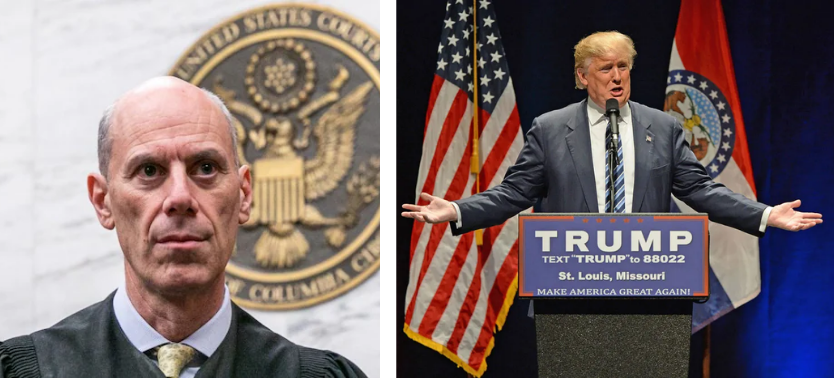President Donald Trump has called for the impeachment of federal judges opposing his policies, including U.S. District Judge James E. Boasberg, who recently blocked the administration’s use of an 18th-century law to deport Venezuelan migrants without due process. The legal battle has raised concerns about a potential constitutional crisis as Trump escalates his attacks on the judiciary.
Who Is Judge James E. Boasberg?
Chief Judge James E. Boasberg of the U.S. District Court for the District of Columbia is a seasoned jurist with bipartisan credentials. Appointed to the D.C. Superior Court by President George W. Bush in 2002 and later elevated to the federal bench by President Barack Obama in 2011, Boasberg has presided over high-profile cases, including grand jury disputes involving Trump’s presidency.
A Washington native, Boasberg attended St. Albans School before playing basketball at Yale University, where he earned both his undergraduate and law degrees. He also holds a master’s degree in history from the University of Oxford. Over the years, he has established himself as a respected legal mind, gaining recognition for his work on the U.S. Foreign Intelligence Surveillance Court (FISA), where he oversaw FBI reforms following concerns about surveillance abuses during the Trump-Russia investigation.
Boasberg’s legal philosophy is marked by a commitment to judicial independence. Glenn Kirschner, his former supervisor at the U.S. Attorney’s Office, described him as “a singularly remarkable prosecutor” who never lost a murder case and was known for his integrity rather than self-promotion.
The Legal Battle Over Venezuelan Deportations
Boasberg recently issued an order preventing the Trump administration from deporting 137 Venezuelan migrants under the Alien Enemies Act of 1798—a rarely used law previously invoked during wartime. The judge ruled that the government’s actions lacked due process and halted deportation flights, with one plane even ordered to return to the U.S. from El Salvador.
The Justice Department argued that the flights had already left U.S. airspace before Boasberg’s written ruling took effect, raising questions about jurisdiction. Despite the court order, Trump’s immigration officials signaled defiance. Tom Homan, the administration’s border czar, stated, “We’re not stopping. I don’t care what the judges think—I don’t care what the left thinks. We’re coming.”
Read More: Trump Rages Against Judge Who Blocked Venezuelan Deportations
Trump’s Response and Calls for Impeachment
In a social media post, Trump lashed out at Boasberg, calling him a “Radical Left Lunatic of a Judge, a troublemaker and agitator.” He asserted that immigration enforcement was a mandate from voters and suggested that judges like Boasberg should be impeached for opposing his policies.
Trump’s remarks mark a shift from his past criticisms of judicial harassment. In 2023, he condemned Democrats for intimidating judges, saying, “They’re constantly saying [judges] should be impeached. But they’re screaming. And you know what? It has an effect on some people.” Now, Trump himself is leading the charge for judicial impeachment.
Judicial Response and Constitutional Concerns
Federal judges and legal experts have condemned Trump’s calls for impeachment, warning against threats to judicial independence. Judge Richard J. Sullivan, a Trump appointee to the U.S. Court of Appeals for the 2nd Circuit, stated, “Threats against judges are threats against constitutional government.” Chief Judge Jeffrey Sutton of the 6th Circuit echoed concerns, emphasizing that “attacking judicial independence… is just not good for the system or the country.”
Chief Justice John Roberts has also warned of rising threats against judges, writing in his 2024 end-of-year report that “elected officials… have raised the specter of open disregard for federal court rulings. These dangerous suggestions… must be soundly rejected.”
What Happens Next?
Boasberg has demanded the Justice Department clarify the timeline of deportation flights and whether his order was violated. Federal judges rarely hold agencies in contempt, but the administration’s defiance could escalate tensions. Legal scholars caution that courts traditionally grant deference to the executive branch on immigration matters, making it uncertain whether Boasberg’s ruling will ultimately stand.
Meanwhile, the administration has taken an unusual step by requesting that the case be reassigned from Boasberg, accusing him of “micromanagement” of executive authority. The U.S. Court of Appeals for the D.C. Circuit has yet to indicate whether it will consider this request.
With Trump’s rhetoric intensifying and judicial opposition mounting, the dispute over Venezuelan deportations may become a defining battle over the separation of powers in his second term. Whether this escalates into a full-fledged constitutional crisis remains to be seen.
